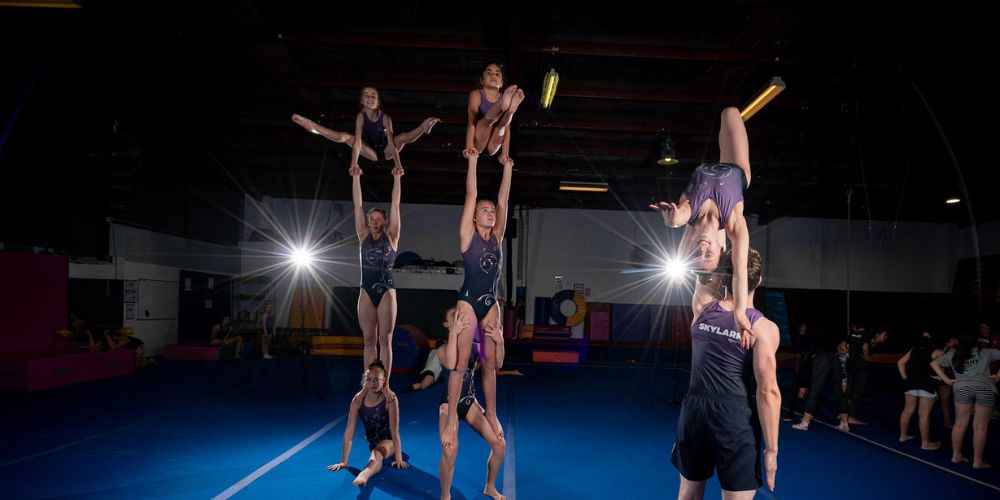Gymnastics, a riveting sport that blends creativity, power, and extraordinary acrobatic feats, has captivated viewers for generations. Gymnasts signify pure commitment and exceptional athleticism, from awe-inspiring flips on the floor to gravity-defying acrobatics on the uneven bars. However, beyond the brilliant performances and gleaming leotards is a world of misconceptions and myths that can confuse our understanding of these extraordinary athletes.
Join us as we make a list and debunk the top 10 most common myths about gymnastics. Read further as we help you clear up your doubts from hearsay surrounding the world of gymnastics, leaving you with the assurance that your child will always be safe while enjoying this wonderful and exhilarating adventure of mastering the arts of leaps and tumbles!
10 Myths About Gymnastics
Myth #1: Gymnasts are always injured.
While gymnastic classes are a physically demanding and risky activity, it is not true that gymnasts are constantly injured. Injuries can happen in every activity, but adequate training, fitness, and safety precautions can reduce the chance of injury. Many gymnasts have long and injury-free careers.
Myth #2: Gymnastics is strictly a female sport.
Gymnastics isn't only a female sport. While women's artistic gymnastics receives greater attention in the media, male artistic gymnastics, rhythmic gymnastics, and acrobatic gymnastics also exist. Floor exercise, vault, rings, pommel horse, parallel bars and horizontal bars are among the events in which men participate.
Myth #3: You have to start gymnastics at a very young age to become successful.
While getting into gymnastics at a young age might have certain benefits, such as fostering early strength and flexibility, it is unnecessary for success. While some gymnasts do start their training at an early age, others start later and still excel. Regardless of the age at which one begins, dedication, hard effort, and proper training may lead to success in gymnastics.
Myth #4: Gymnastics is all about performing flashy tricks and stunts.
Gymnastics is more than just pulling off impressive acrobatics and tricks. Gymnastics emphasises discipline, strength, endurance, precision, creative expression, and stunning motions. Routines are meticulously designed and call for physical prowess, elegance, and technical mastery.
Myth #5: Gymnastics is only for elite athletes and not for recreational participants.
Gymnastics isn't just for professional athletes. Gymnastics is a sport with a high level of competition. Still, it offers leisure courses and programmes for individuals of all ages and abilities. Gymnastics offers health, coordination, and pleasure prospects as recreational exercise.
Myth #6: Gymnasts are weak. They rely solely on flexibility.
Gymnasts must also have a lot of strength in addition to their flexibility. Strength, power, flexibility, agility, balance, and coordination are all necessary for gymnastics. Gymnasts use strenuous strength training to carry out their routines and master their formidable talents.
Myth #7: Gymnastics is a sport only for the genetically gifted.
While some physical characteristics, such as body proportions, flexibility, or muscular composition, that may be favourable in gymnastics may be influenced by genetics, success in the sport largely depends on hard effort, dedication, and training. Years of practice and tenacity have helped many accomplished gymnasts reach their goals.
Myth #8: Gymnasts retire early and have limited career opportunities outside the sport.
Although gymnasts frequently retire younger than competitors in certain other sports, several professional options remain open after retirement. Gymnasts can go on to work as coaches, judges, or in sports administration. In addition, their abilities in self-control, endurance, and physical fitness may be used for endeavours and employment outside of gymnastics.
Myth #9: Gymnastics is only for the young and flexible.
Gymnastics is not just for the young and strong. While flexibility is undoubtedly beneficial, gymnastics may be practised and enjoyed by people of all ages and abilities. Recreational gymnastics programmes are available for adults and people of varying levels of flexibility.
Myth #10: Gymnastics is an individual sport with no teamwork involved.
While gymnastics is sometimes viewed as an individual sport due to its emphasis on individual achievements, a substantial team component is involved. Teams compete and work together to earn high scores in competitive gymnastics. Gymnasts also frequently practise and encourage one another within their teams, establishing a sense of brotherhood.

Is Gymnastics Good for Your Child Then?
Children benefit greatly from gymnastics because it encourages physical health, which is essential for their general well-being. Children learn a range of moves in gymnastics that help them gain strength, flexibility, coordination, balance, and agility. They gain the ability to manage their body and master difficult abilities, which helps them develop physically. Gymnastics gives you full-body exercise by working on various muscle groups and enhancing cardiovascular fitness. Children who regularly practise gymnastics can develop superior motor skills and body awareness, enhancing their physical prowess and contributing to a healthier lifestyle.
Gymnastics also helps kids develop attention and discipline. Following teachers' directions, using specialised methods, and regularly practising routines are all necessary for success in the sport. Children learn attention and concentration through this methodical technique, which they may use in other areas. Children learn the importance of perseverance and grow a solid work ethic by establishing objectives and working regularly to attain them. They recognise the value of commitment and persistence, which may help them academically, socially, and in future endeavours.
Frequently Asked Questions
Are there any career opportunities in gymnastics outside of performing in competitions?
Yes, gymnastics offers professional options beyond competitive performance. Gymnasts can go on to work as coaches, judges, or in sports administration. In addition, gymnastics may help you develop traits like tenacity, discipline, and physical fitness that are useful in various non-gymnastics careers.
How strong is a gymnast?
Gymnasts get a lot of plyometric skills through consistent practice of swinging, bounding, and tumbling. Gymnasts can exert such strong forces because of their static and conventional strength training on rings.
Is gymnastics a costly sport?
Gymnastics fees might change based on the location, degree of commitment, and facility or club. The cost of training clothing, facility use fees, competition costs, and coaching fees are just a few examples of expenses. Recreational initiatives and community-based programmes can provide possibilities for involvement that are more reasonably priced.
Can you practise gymnastics at home?
Gymnastics is a sport that normally requires specialised equipment and instruction for appropriate skill development and safety, even though certain simple exercises and stretching may be done at home. Taking gymnastics instruction or lessons at a reputable gym with qualified teachers and appropriate apparatus is advised.
Conclusion
It's important to eliminate gymnastics-related myths and understand the genuine essence of this amazing sport. People of various ages and capacities may engage in and benefit from gymnastics; it is not just for the young and flexible. Gymnasts frequently cooperate and support one another as they strive for perfection, making it clear that it is not only a solitary sport devoid of collaboration.
Gymnastics is more than simply impressive acrobatics and tricks. It provides a wide range of social, psychological, and physical advantages. Strength, flexibility, discipline, and attention are all developed while promoting mental health, teamwork, and confidence. It provides them with skills for life that go well beyond the gym.
Let's promote a more inclusive and truthful view of gymnastics as we dispel these myths and misunderstandings. Gymnastics has plenty to offer everyone, whether they want to participate for leisurely fun or to achieve competitive ambitions. So let's embrace this sport's core and encourage others to do the same.

